This article needs additional citations for verification .(November 2024) |
Techobanine is a coastal village in Mozambique.
This article needs additional citations for verification .(November 2024) |
Techobanine is a coastal village in Mozambique.
In 2011, an agreement was signed between Mozambique and Botswana for the construction of a deepwater port. [1]

Mozambique, officially the Republic of Mozambique, is a country located in southeast Africa bordered by the Indian Ocean to the east, Tanzania to the north, Malawi and Zambia to the northwest, Zimbabwe to the west, and Eswatini and South Africa to the southwest. The sovereign state is separated from the Comoros, Mayotte and Madagascar by the Mozambique Channel to the east. The capital and largest city is Maputo.
Mozambique was a Portuguese colony, overseas province and later a member state of Portugal. It gained independence from Portugal in 1975.
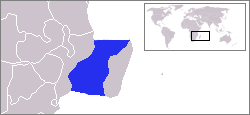
The Mozambique Channel is an arm of the Indian Ocean located between the Southeast African countries of Madagascar and Mozambique. The channel is about 1,700 km long and 419 km across at its narrowest point, and reaches a depth of 3,292 m (10,801 ft) about 230 km off the coast of Mozambique. A warm current, the Mozambique Current, flows in a southward direction in the channel, leading into the Agulhas Current off the east coast of Southern Africa.

Portuguese Mozambique or Portuguese East Africa were the common terms by which Mozambique was designated during the period in which it was a Portuguese overseas province. Portuguese Mozambique originally constituted a string of Portuguese possessions along the south-east African coast, and later became a unified province, which now forms the Republic of Mozambique.

Maputo is the capital and largest city of Mozambique. Located near the southern end of the country, it is within 120 kilometres of the borders with Eswatini and South Africa. The city has a population of 1,088,449 distributed over a land area of 347.69 km2 (134.24 sq mi). The Maputo metropolitan area includes the neighbouring city of Matola, and has a total population of 2,717,437. Maputo is a port city, with an economy centered on commerce. It is noted for its vibrant cultural scene and distinctive, eclectic architecture. Maputo was formerly named Lourenço Marques.
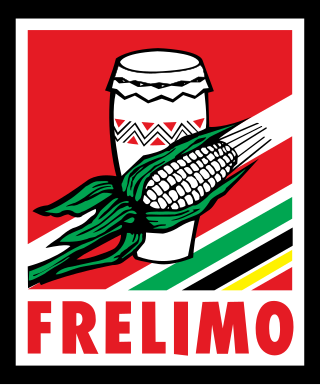
FRELIMO is a democratic socialist political party in Mozambique. It has governed the country since its independence from Portugal in 1975.

Mozambique is divided into 10 provinces (províncias) and 1 capital city (cidade) with provincial status:

Beira is the capital and largest city of Sofala Province, in the central region of Mozambique.
The Mozambique national football team represents Mozambique in men's international football competitions and is controlled by the Mozambican Football Federation, the governing body for football in Mozambique. Mozambique have never qualified for a FIFA World Cup, but they have qualified for five Africa Cup of Nations in 1986, 1996, 1998, 2010, and most recently 2023, being eliminated in the first round in all five. In 1997, the Mozambique Football Federation became a founding member of COSAFA.

The Mozambican Civil War was a civil war fought in Mozambique from 1977 to 1992. Like many regional African conflicts during the late twentieth century, the impetus for the Mozambican Civil War included local dynamics exacerbated greatly by the polarizing effects of Cold War politics. The war was fought between Mozambique's ruling Marxist Mozambique Liberation Front (FRELIMO), the anti-communist insurgent forces of the Mozambican National Resistance (RENAMO), and a number of smaller factions such as the PRM, UNAMO, COREMO, UNIPOMO, and FUMO.

The Assembly of the Republic is the unicameral legislative body of the Republic of Mozambique established in 1977.
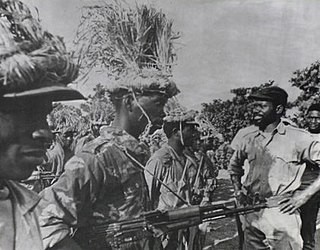
The Mozambican War of Independence was an armed conflict between the guerrilla forces of the Mozambique Liberation Front (FRELIMO) and Portugal. The war officially started on 25 September 1964, and ended with a ceasefire on 8 September 1974, resulting in a negotiated independence in 1975.

Mozambique – United States relations are bilateral relations between Mozambique and the United States.

The People's Republic of Mozambique was a socialist state that existed in present-day Mozambique from 1975 to 1990. It was established when the country gained independence from Portugal in June 1975 and the Mozambican Liberation Front ("FRELIMO") established a one-party socialist state led by Samora Machel. The state enjoyed close political and military ties with the Soviet Union, which was one of the first nations to provide diplomatic recognition and financial support to the fledgling FRELIMO government. For the duration of its history, the People's Republic of Mozambique remained heavily dependent on Soviet aid, both in financial terms as well as with regards to food security, fuel, and other vital economic necessities. From 1977 to 1992, the country was devastated by a deadly civil war which pitted the armed forces against the anti-communist Mozambique National Resistance (RENAMO) insurgency, backed by neighbouring Rhodesia and South Africa.

Christianity is the largest religion in Mozambique, with substantial minorities of the adherents of traditional faiths and Islam.

Filipe Jacinto Nyusi is a Mozambican politician serving since 2015 as the fourth president of Mozambique. He is the current leader of FRELIMO, the party that has governed Mozambique since its independence from Portugal in 1975. Additionally, he has served as the Chairman of the Southern African Development Community since August 2020. During his time in office, President Nyusi has promoted peace and security, and signed multiple agreements with the main opposition parties, RENAMO, to bring a definitive and lasting peace to Mozambique.
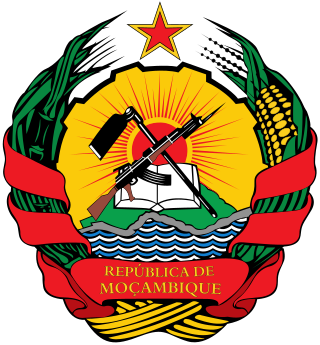
Mozambique allows most countries that are not visa exempt to obtain a visa on arrival. However, nationals of certain countries must obtain a visa online or from one of the Mozambican diplomatic missions around the world before being allowed into the country.
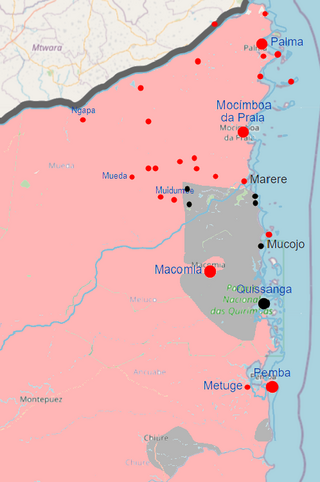
The insurgency in Cabo Delgado is an ongoing Islamist insurgency in Cabo Delgado Province, Mozambique, mainly fought between militant Islamists and jihadists attempting to establish an Islamic state in the region, and Mozambican security forces. Civilians have been the main targets of terrorist attacks by Islamist militants. The main insurgent faction is Ansar al-Sunna, a native extremist faction with tenuous international connections. From mid-2018, the Islamic State's Central Africa Province has allegedly become active in northern Mozambique as well, and claimed its first attack against Mozambican security forces in June 2019. In addition, bandits have exploited the rebellion to carry out raids. As of 2020, the insurgency intensified, as in the first half of 2020 there were nearly as many attacks carried out as in the whole of 2019.